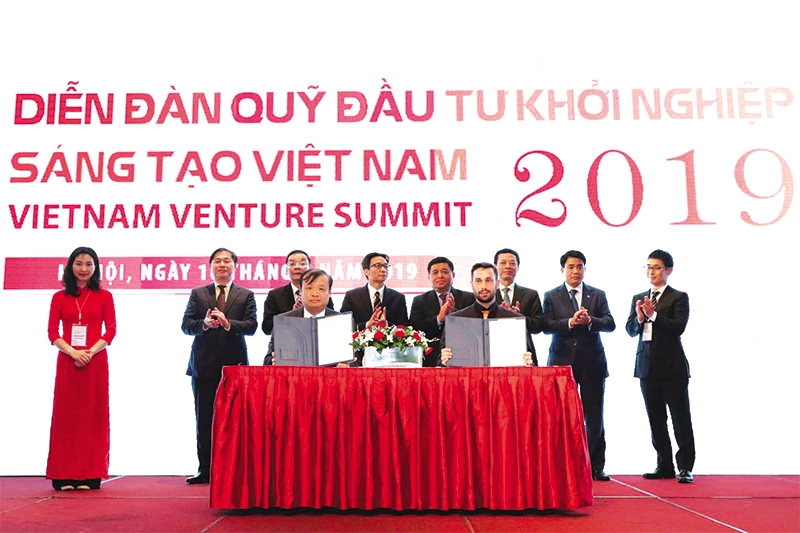Action plan trio to boost Innovation
 |
| Significant investment commitments have been made at the Vietnam Venture Summit 2019 |
At last week’s Vietnam Venture Summit, Nguyen Chi Dung, Minister of Planning and Investment, said, “To achieve the goal of renewing the growth model based on innovation, the Vietnamese government is making strong efforts to build a number of supporting policies and complete the innovation ecosystem to create the most favourable conditions for development in the field. Three major action plans are in focus, including unblocking the financial resources for innovation activities.”
The summit aimed to attract more investment from domestic and international venture capital funds into the local startup community, showing the government’s strong determination to create a knowledge-based digital economy.
Concrete policies ahead
Aware of the need for concrete strategies and policies to approach potential foreign investors in a more active manner, an increasing number of ministries and agencies in Vietnam are joining efforts with the government to support the startup community.
Currently, the government has assigned the Ministry of Planning and Investment (MPI) to build the National Strategy on Industry 4.0, the development of the National Innovation Centre (NIC), and work to connect Vietnamese talents via the Vietnam Innovation Network, thus strengthening innovation activities in the country.
“During the implementation of this task, the MPI has been closely working with relevant ministries and agencies on solutions and tools to support the development of the innovation ecosystem, with three key action plans focusing on developing qualified human resources to create an innovation-based economy; supporting innovation activities among businesses; and unblocking capital sources for innovation,” said Minister Dung.
For the first action plan, the MPI has co-operated with relevant agencies and ministries to establish the Vietnam Innovation Network. This activity connects more than 100 technology talents globally to share experience and co-operate with research institutes, technology experts, and the business community to solve technology issues and the challenges facing the economy, thus creating high-quality workforce for innovation activities in Vietnam.
“In addition to co-operating with partners to organise training programmes at home, in the upcoming time, we will also expand the network by introducing scholarship programmes to send Vietnamese talents aboard for advanced training at a number of prestigious universities. The establishment of the Vietnam Global Innovation Fund aims to realise this goal,” said Minister Dung.
Under the second action plan, the MPI will promote innovation activities among businesses and connect startups with powerful enterprises to integrate their innovations into business activities to improve productivity and product quality.
The Vietnam Venture Summit, meanwhile, was one of the first activities of the third action plan to unblock capital sources. At the event, for the first time, many of the biggest venture investment funds in the region and the world gathered to discuss the opportunities in the Vietnamese startup market as well as communicate their expectations to the Vietnamese government on what issues it needs to solve to make the market more attractive.
In addition to these plans, Vietnam is expected to offer special incentives which are approved by the prime minister for investment activities at the NIC. This will provide an additional boost to the development of the startup community. To achieve this, the Ministry of Science and Technology is co-operating with relevant government agencies to develop a skilled workforce – the motivation for innovation – for the digital transformation. At the same time, other ministries and agencies are also making moves to support the development of the startup community.
New funding wave expected
With the participation of over 100 domestic and international venture funds, including well-known names like SoftBank Vision Fund, CyberAgent Ventures, Mekong Capital, 500 Startups Vietnam, DT&I, IDG Ventures Vietnam, VinaCapital Ventures, and BCG Digital Ventures, the summit proves how attractive the Vietnamese startup market is.
Ollie Wood, head of Talent at Golden Gate Ventures, told VIR, “We attended the event to look for investment opportunities in Series A investment, and maybe Series B investment in the future. We are interested in consumer, logistics, fintech, healthcare, and property among other sectors.”
Venture funds from South Korea, Japan, the US, and the EU are sharing the same interests. Spearheading the race, at the summit, 18 venture investment funds committed to invest VND18 trillion ($782.6 million) in local startups in the next three years.
“With the Vietnamese government’s vision, we believe that the event will be the start of a new investment and development wave in Vietnam’s innovation ecosystem, thus contributing to the development of the domestic digital economy,” said Deputy Prime Minister Vu Duc Dam at the important event.
Investment in startups in Vietnam has grown impressively in recent years both in the number of deals and their value. In 2012, Vietnam had around 400 startups, which then grew more than four-fold to 1,800 startups in 2015 and hit about 3,000 in 2017-2018.
According to the 2018 annual report on startup investment by Topica Founder Institute (TFI), a startup accelerator programme in Vietnam and Thailand, in 2018, Vietnamese startups received $889 million of investment from domestic and international venture capital funds through 92 deals, tripling the 2017 figure and rising six-fold from 2016.
In terms of early stage investment, Seed or Series A investment, the reports of Singapore-based technology business media site KrASIA and the US’ consulting firm Bain & Company showed that Vietnamese startups received $150 million of investment in 2018, doubling the 2017 figure. Early stage investment in startups is forecast to reach $205 million, $320 million, and $440 million in 2019, 2020, and 2021, respectively.
Currently, over 40 venture capital funds have investments in Vietnamese startups, twice as many as in 2015. Along with foreign funds, more Vietnamese giants such as FPT, Viettel, Vingroup, CMC, and CenGroup have also been joining the race.
Last year witnessed huge investments in startups by leading venture funds. For instance, VinaCapital established VinaCapital Ventures with $100 million, Vingroup launched a fund to support startups and another fund to support sci-tech research with an investment fund of VND2 trillion ($87 million) and a venture fund of $300 million to support innovation ideas.
| Justin Nguyen - Partner, Monk’s Hill Ventures
I believe that the startup market in Vietnam started getting interesting around five years ago, driven by strong GDP growth, widespread smartphone usage, supportive regulations, a young population, and the rising middle class. A lot of venture investors are now looking at Vietnam, after they realised that bigger markets in the region, like China, have slowed down. The tech talent in Vietnam is also amazing, and we often joke that any startups in the ASEAN should have a Vietnamese engineer. In terms of challenges, I think Vietnamese startups have two significant problems. The first is how to find mid-level managers, because there’s a great shortage in the local market. Second, once they get off the ground, many startups are also struggling to scale up their business, which is partly driven by the lack of skilled middle-managers. Scalability is very important for investors, so I believe this is something Vietnamese entrepreneurs will have to tackle soon. Linh Pham - Founder, Logivan
Startup founders usually have to go out a lot to raise funds, which can be stressful. From my experience, venture capital investors know each other very well, and I often try to work with an investor who is a “super connector”. By doing this, I reduce the time spent on meeting other investors, as this super connector will help me meet the right people and I don’t have to waste time looking for the unsuitable ones. So instead of going around fundraising, I can focus on managing the company. Also, it’s true that a lot of investors say they want to add synergy and value to the startup community, but I think entrepreneurs should keep in mind that venture investors have many companies in their portfolio so they can’t dedicate too much time and effort to just one startup. It’s all about managing expectations from both sides. That said, our experience with foreign investors so far has been fantastic. We maintain good relationships and they show us the kind of respect that entrepreneurs deserve. Eddie Thai - General partner 500 Startups Vietnam
Many investors used to be reluctant about investing in Vietnam’s startup scene because of various challenges in terms of regulations, human resources, and so on. However, things have changed greatly in the past few years, and real data has shown the positive trajectory of investments into Vietnamese startups. For example, funding has increased by 400 per cent in only a few years, and we even have a number of Series C or D rounds coming up. In fact, Vietnam is so hot that nobody wants to miss the boat now. I believe that investments of $15 million are likely to be popular in the future. The early movers now have a clear advantage in this booming scene. We talk with various startup teams on a weekly basis, and we’re glad to see many founders now becoming more familiar with how the market is run. There can be risks of overheating and investors should be cautious, but I think the best startups in Vietnam can definitely survive the next decade or so. Linh Thai - Partner, Vingroup Ventures
We want to invest in startups that can collaborate with the Vingroup ecosystem, because Vingroup operates in a wide variety of sectors and we believe that this is the best way we can assist entrepreneurs in their growth path. It also acts as a certificate of excellence for these startups when they want to seek funding from other investors. When looking at what to invest in, we want to see strong teams with a marketable product. Ideas are great and Vietnam’s tech skills are definitely strong, but the key here is whether the entrepreneurs can sell them to the market. We also want to see whether these products and their owners have the potential to venture outside Vietnam later. For new investors to Vietnam, we’d advise against going all alone. We think it’s best for them to invest or co-operate with an existing fund in Vietnam first, before they figure out their own strategy and start to expand. Tran Nhat Khanh - Partner, VinaCapital Ventures
Ten years ago, it used to be very difficult for me to discuss business ideas in Vietnam with my father, who himself ran a small company. There were a lot of challenges in starting a company here, and I’m happy to see that things have changed. I also used to work overseas and the more I remained there, the more frustrated I was with the stagnant markets there. That prompted me to return to Vietnam, where opportunities are growing. I’ve also noticed many wealthy businessmen here who are willing to invest in the future generation of leaders, especially in niche areas. Before investing, we also ask ourselves how we can create value for the startup, and whether two sides can work together and share the same long-term vision. Founders in Vietnam are becoming more sophisticated these days, and they no longer hesitate to ask us in a very straightforward manner about the kind of network and know-how we can bring to their business. |
What the stars mean:
★ Poor ★ ★ Promising ★★★ Good ★★★★ Very good ★★★★★ Exceptional
 Tag:
Tag:
Related Contents
Latest News
More News
- Hermes joins Long Thanh cargo terminal development (February 04, 2026 | 15:59)
- SCG enhances production and distribution in Vietnam (February 04, 2026 | 08:00)
- UNIVACCO strengthens Asia expansion with Vietnam facility (February 03, 2026 | 08:00)
- Cai Mep Ha Port project wins approval with $1.95bn investment (February 02, 2026 | 16:17)
- Repositioning Vietnam in Asia’s manufacturing race (February 02, 2026 | 16:00)
- Manufacturing growth remains solid in early 2026 (February 02, 2026 | 15:28)
- Navigating venture capital trends across the continent (February 02, 2026 | 14:00)
- Motivations to achieve high growth (February 02, 2026 | 11:00)
- Capacity and regulations among British areas of expertise in IFCs (February 02, 2026 | 09:09)
- Transition underway in German investment across Vietnam (February 02, 2026 | 08:00)



























 Mobile Version
Mobile Version